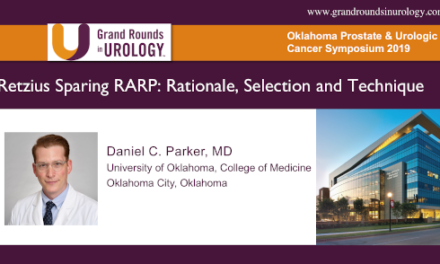Daniel Shoskes, MD, presented “Industry Perspective: The Oncotype DX Genomic Prostate Score Assay Test” for the Grand Rounds in Urology audience in March 2022.
How to cite: Shoskes, Daniel. “The Oncotype DX Genomic Prostate Score Assay Test.” March 2022. Accessed Nov 2025. https://grandroundsinurology.com/industry-perspective-the-oncotype-dx-genomic-prostate-score-assay-test/
Industry Perspective: The Oncotype DX Genomic Prostate Score Assay Test
Daniel Shoskes, MD, FRCSC, Medical Director in Medical Affairs for Urologic Oncology at Exact Sciences, and Emeritus Professor of Urology at the Cleveland Clinic, explains how Exact Science’s Oncotype DX Genomic Prostate Score (GPS) assay test works, and considers its utility in guiding treatment decisions. He begins by discussing why genomics are of interest in relation to prostate cancer, highlighting the fact that abnormal gene expression may lead to abnormal/unregulated cell growth, which in turn may lead to irregularity on direct palpation, altered appearance on MRI, elevated PSA, and disordered gland appearance on histology. The researchers at Exact Sciences, Dr. Shoskes explains, hypothesized that these clinical features might not completely capture the prognosis of the patient, and that looking at gene expression directly might give further information. He relates how the researchers selected genes for association with metastasis and then refined the list for associations with death and adverse pathology. They found 17 genes that predicted recurrence in both the primary and highest Gleason patterns, and also had consistent analytical performance and expression in samples as small as 1mm. Dr. Shoskes then discusses how predictive this 17-gene assay is, noting that the GPS assay is an independent predictor of metastasis and prostate cancer death within 10 years of radical prostatectomy and may be associated with prostate cancer outcomes for up to 20 years after diagnosis. He highlights that incorporating the GPS result with NCCN Guidelines can provide a comprehensive risk profile. Dr. Shoskes considers how the GPS assay can be used practically, explaining that for low-risk patients, it can help inform shared decision-making for active surveillance vs. immediate therapy with curative intent, while for higher-risk patients, it can help inform the decision for treatment intensification. He concludes that the Oncotype DX GPS assay provides meaningful, actionable information on the biologic potential of prostate cancer independent of clinical, pathologic, and radiographic data.
For more on the role of genomics in prostate cancer risk stratification, visit the Next Generation Learning Center on Genomics and Biomarkers.
ABOUT THE AUTHOR
Daniel A. Shoskes, MD, MSc, FRCS(C), is the Vice President, Global Medical Director of Uro-Oncology at Ferring Pharmaceuticals in Cleveland, Ohio. Dr. Shoskes also serves as Professor Emeritus of Urology at Case Western Reserve University in Cleveland, Ohio. Dr. Shoskes' clinical interests include renal transplantation, chronic prostatitis, chronic pelvic pain syndrome, interstitial cystitis and benign prostatic hypertrophy. Dr. Shoskes’ areas of speciality in Medical Affairs include development of Investigator Initiated Trials Programs, commercial launch of new diagnostic tests in Urologic Oncology, leadership of multifunctional teams, collaboration with Marketing and Sales, training of sales staff and medical science liaisons, development of medical slide decks, and clinical trial design.





